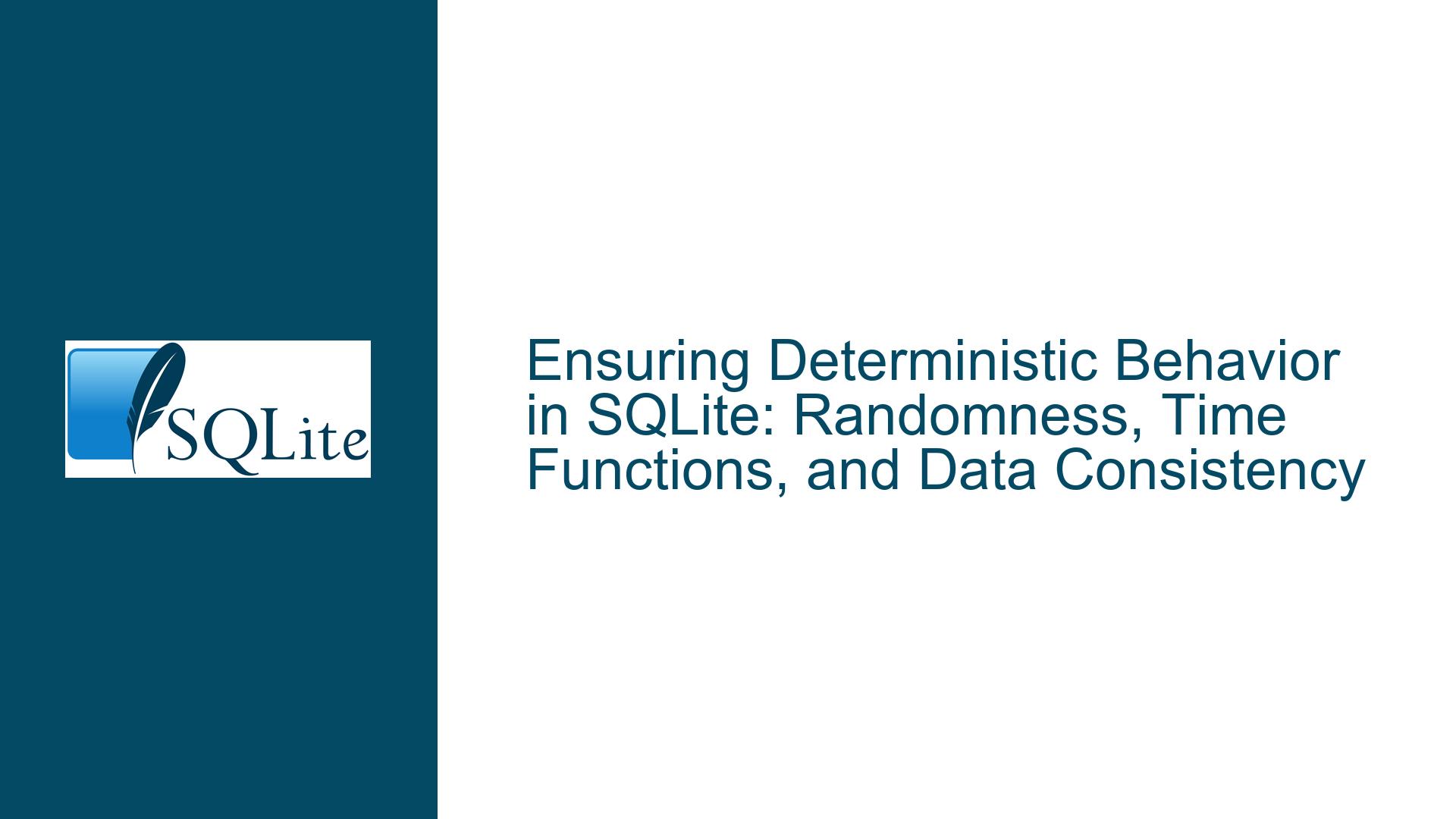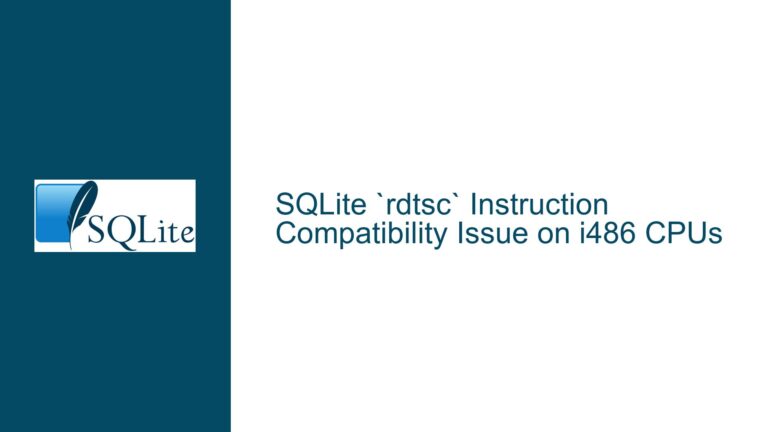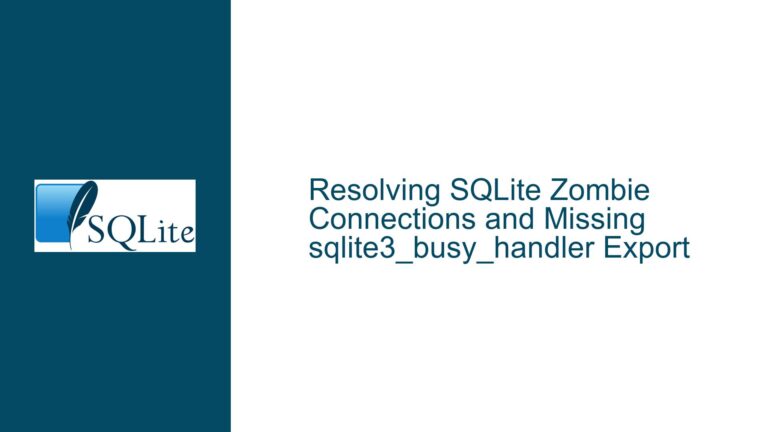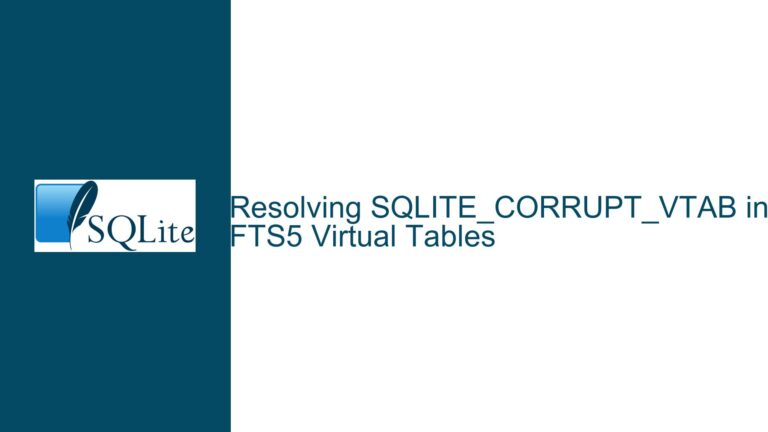Ensuring Deterministic Behavior in SQLite: Randomness, Time Functions, and Data Consistency
Understanding Deterministic Operations in SQLite
Determinism in databases refers to the property where the same sequence of operations, when applied under identical conditions, produces the same results every time. In SQLite, achieving deterministic behavior is crucial for scenarios like testing, simulations, and data replication, where consistency and reproducibility are paramount. However, SQLite’s built-in functions such as random(), randomblob(), and time-based functions like now() introduce non-deterministic elements into the database operations. These functions rely on external factors such as system time and random number generation, which can vary between executions, leading to inconsistencies in the resulting data.
The core challenge lies in ensuring that these non-deterministic functions behave predictably. For instance, if two databases receive the same sequence of SQL statements, they should produce identical data, even if the underlying operations involve randomness or time-based calculations. This requires controlling the sources of non-determinism, such as seeding the random number generator or overriding the system time used by time functions.
Challenges with Randomness and Time Functions in SQLite
The primary sources of non-determinism in SQLite are the random() and randomblob() functions, which generate pseudo-random numbers and binary data, respectively. These functions are typically seeded using the system’s random number generator, which introduces variability between executions. Similarly, time-based functions like now() rely on the system clock, which changes continuously, making it impossible to reproduce the same results unless the time value is explicitly controlled.
Another challenge arises from the way SQLite handles primary key (PK) generation, especially when using auto-incrementing integers or UUIDs. While auto-incrementing integers are generally deterministic within a single database instance, UUIDs often incorporate random elements, leading to non-deterministic behavior across different instances. This becomes problematic when trying to replicate data across multiple databases or when performing comparative analyses.
The lack of built-in mechanisms to control these non-deterministic elements at the SQL level complicates the task of ensuring deterministic behavior. While SQLite provides low-level interfaces for customizing these behaviors, such as the sqlite3_vfs object for overriding time functions and the sqlite3_randomness() function for controlling the PRNG, these solutions require significant technical expertise and are not easily accessible to users who rely on vanilla SQLite installations.
Implementing Deterministic Behavior: Custom Functions and VFS Overrides
To achieve deterministic behavior in SQLite, users can implement custom solutions that override the default behavior of non-deterministic functions. One approach is to create custom SQL functions that replace random(), randomblob(), and now() with deterministic alternatives. For example, a custom random() function could use a seeded pseudo-random number generator (PRNG) to produce repeatable sequences of random numbers. Similarly, a custom now() function could return a fixed timestamp or a timestamp derived from a controlled source, such as a transaction ID or a user-defined value.
Another approach involves leveraging SQLite’s Virtual File System (VFS) interface to override the default implementations of time and randomness functions. By creating a custom VFS shim, users can intercept calls to xCurrentTimeInt64() and xRandomness() and provide deterministic values instead of relying on the system clock or OS-provided randomness. This method requires modifying the SQLite source code or creating a custom extension, but it offers a high degree of control over the database’s behavior.
For users who prefer not to modify SQLite’s source code, distributing custom extensions or precompiled binaries with the desired functionality is a viable alternative. These extensions can be loaded dynamically at runtime, allowing users to enable deterministic behavior without altering their SQLite installation. However, this approach requires careful consideration of compatibility and deployment issues, especially in environments where multiple users or applications share the same SQLite instance.
In conclusion, achieving deterministic behavior in SQLite involves addressing the inherent non-determinism of built-in functions and implementing custom solutions to control randomness and time-based operations. While SQLite does not provide built-in support for deterministic behavior at the SQL level, its extensible architecture allows users to create custom functions and VFS overrides to meet their specific requirements. By understanding the challenges and exploring the available solutions, users can ensure that their SQLite databases produce consistent and reproducible results across different executions and environments.






